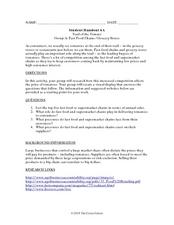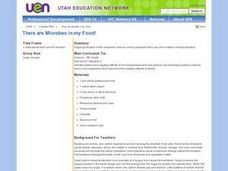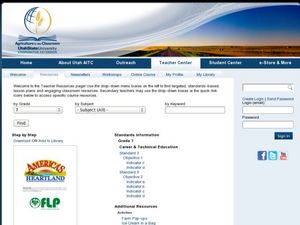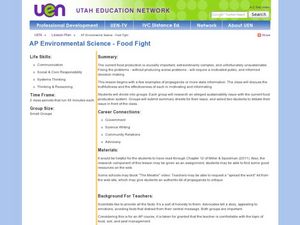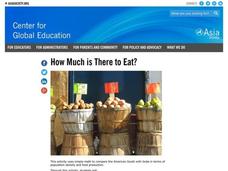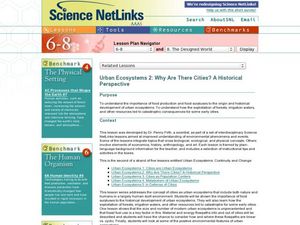Curated OER
Where Does It Come From?
Do you or your learners know where apples or potato chips come from? If not, you will after this lesson. To explore careers in agriculture, learners first examine the importance of agriculture to our nation. They view several movies...
Curated OER
A Yen for Maximum Residue Limits in Food
Future public health officials or agriculturists read an article and answer questions concerning the Japanese regulations for pesticide exposure. They compare the maximum residue limit for two, 4-D of Japan with other countries. This is...
Curated OER
Home Living / Daily Living: Labels on Food Products
Everybody needs to know how to make healthy choices when it comes to food. Understanding food labels is the first step. Using empty food packaging, you'll discuss what food labels are, what information can be found on them, and how to...
Curated OER
Fast Food Tomatoes
Here is a fantastic reading passage and discussion question to challenge your advanced learners. They read a passage describing arguments against the mass production of tomatoes for fast food resulting in poor treatment of workers. Then...
Curated OER
Agriculture Awareness Through Poetry
Whether you are viewing a landscape painting of a farm, examining a still-life portrait of a bowl of fruit, or reading a descriptive poem about cultivating food, you can't deny that agriculture plays a major role in visual and language...
Curated OER
Lesson Plan: What We Value
How have values changed? How does our society influence our choices? Two great questions lead this discussion about food production, history, and cause-and-effect relationships. Pupils analyze a limestone relief from Assyria, research...
Curated OER
Evaluating Information on Food Labels
What kinds of foods include corn? Corn syrup? Start by viewing a clip of Food Inc. with your middle or high schoolers. Then, study a list of corn-derived ingredients, encouraging your class to see how many food products contain corn. A...
Curated OER
Food Science, Scientific Method: Reliability and Validity in Empirical Research
Secondary learners explore food science by conducting an experiment using the scientific method and creating a science fair project based on their findings. They learn about food technology and modern research development. They...
Curated OER
Student Handout 6A :Trail of the Tomato Group A: Fast Food Chains /Grocery Stores
There is a lot to be learned from a tomato. Kids research the pressures that four major fast food and supermarket chains endure to keep customers coming back. They analyze how this pressure is then transferred to those working in the...
Curated OER
There are Microbes in my Food!
Sixth graders produce yogurt in the classroom as an example of the use of microbes in food production, and record observations in science journals.
Curated OER
America's Heartland: Step-By-Step Lesson Guide
An excellent resource gets kids looking at agricultural production to better understand the careers needed in distributing foods from the farm to the consumer. Book, poster, web, and video links are included for teacher use. There is...
One Hen
Making Choices
When choosing what foods to eat, there are a lot of factors to consider. To help make the decision a little easier, young learners work in small groups developing short plays, stories, or advertisements that address the different issues...
Curated OER
AP Environmental Science-Food Fight
The content in this lesson is of a controversial nature. Please review to make sure it is suitable for your class. A video, The Meatrix is shown to the class, and then they discuss the emotionally-charged language that it uses. They are...
Curated OER
Food Without Oil
High schoolers discuss the oil crisis and how it affects the food they eat. In this food production lesson plan, students look at the foods sold in their grocery store and imagine which would leave if there was no oil to ship the food....
Curated OER
Sustainable Agriculture: Soils And Food Production
Ninth graders recognize differences in soil quality from one area to another. They describe the importance of organic matter in soil health and suggest ideas that help provide adequate food supplies for the world. The interview a person...
Curated OER
Source Search: Agricultural Products
Farmers just farm, right? Find out how important agricultural products are to our modern society. Learners will explore the foods, textiles, and fuels made from industrial farm goods. They'll also explore the idea of choosing an...
Curated OER
How Much is There to Eat?
Learners examine food production related to population density. In this interdisciplinary lesson, students gather data regarding food production in the American South and in India. Learners follow the outlined steps to calculate the...
Curated OER
Urban Ecosystems 2: Why are There Cities? A Historical Perspective
Second in a series of five lessons, this lesson encourages preteens to consider cities as urban ecosystems. First, they keep a food diary for a few days. They visit the Natrional Agricultural Statistics Service website for current data...
Media Smarts
Looking at Food Advertising
Tony The Tiger, The HoneyComb Kid, The Nestle Quick Bunny. As part of a study of the methods advertisers use to sell foods and how this advertising effects their food choices, kids create their own spokescharacter and/or jingle for one...
Curated OER
Step by Step
Students explore agriculture by creating a food production diagram. For this farming lesson, students read assigned text about the entities that assist in food production companies such as farmers, truckers and supermarkets. Students...
Teach Engineering
Package Those Foods!
Designing the right package — it's more than a pretty picture. Challenge small groups to design a food package. They must consider the type of food they are packaging and the package's ability to control the physical and chemical changes...
Curated OER
Urban Ecosystems 2: Why Are There Cities? A Historical Perspective
Middle schoolers investigate the importance of food surpluses to the historical development of urban ecosystems.
Curated OER
You've Gotta Have a Gimmick!: A Lesson in Junk Food Advertising
Students examine marketing techniques used in television and magazine snack food ads. They analyze and discuss Internet kids clubs, complete various handouts that examine ads for food, and create a commercial for a food product.
Serendip
Food, the Carbon Cycle and Global Warming
As the world population increases, demands on the carbon cycle also increase. A well-designed lesson plan first explores the greenhouse effect and its impact on global warming. Further sections have pupils study the effect of greenhouse...
Other popular searches
- Food Production Flow Charts
- Food Production by Continent
- Hormones & Food Production
- Plant Food Production
- Food Production Chain
- Food Production Plan
- Energy and Food Production
- Tree Food Production
- Food Production Oil
- Mass Production Food
- Anthropology Food Production
- Bacteria in Food Production










